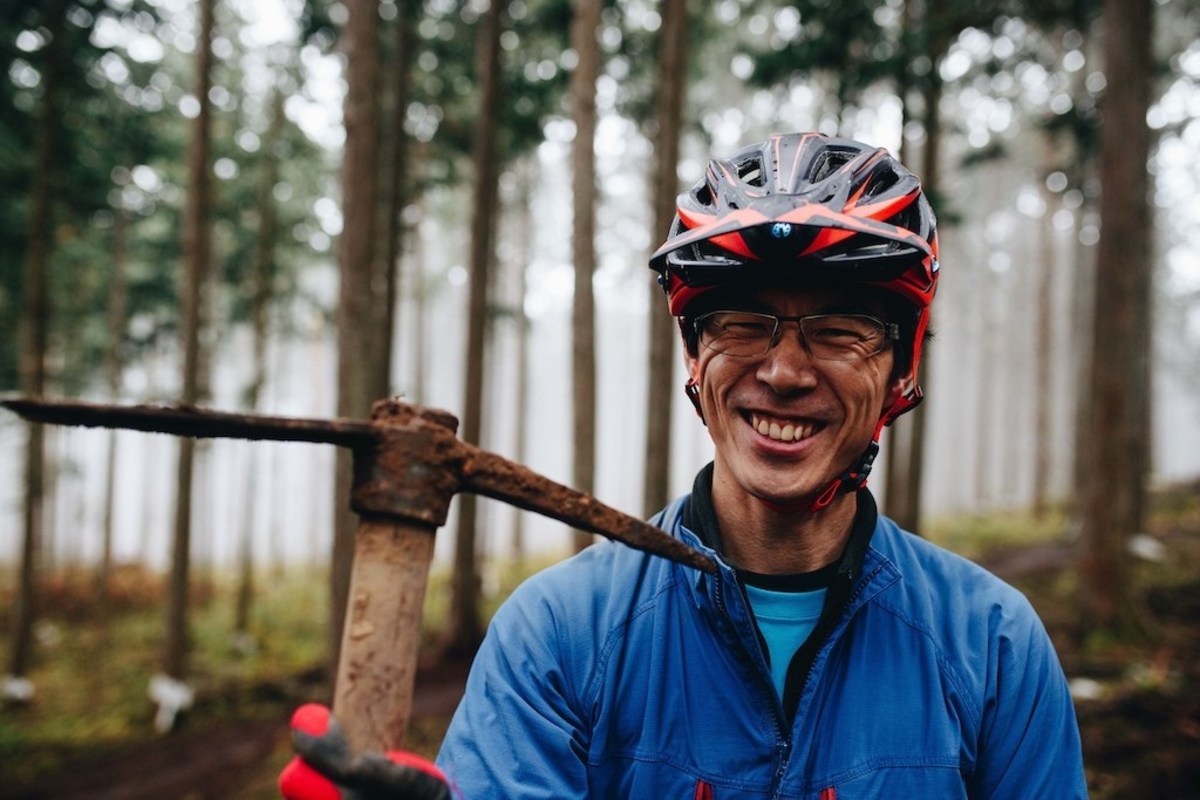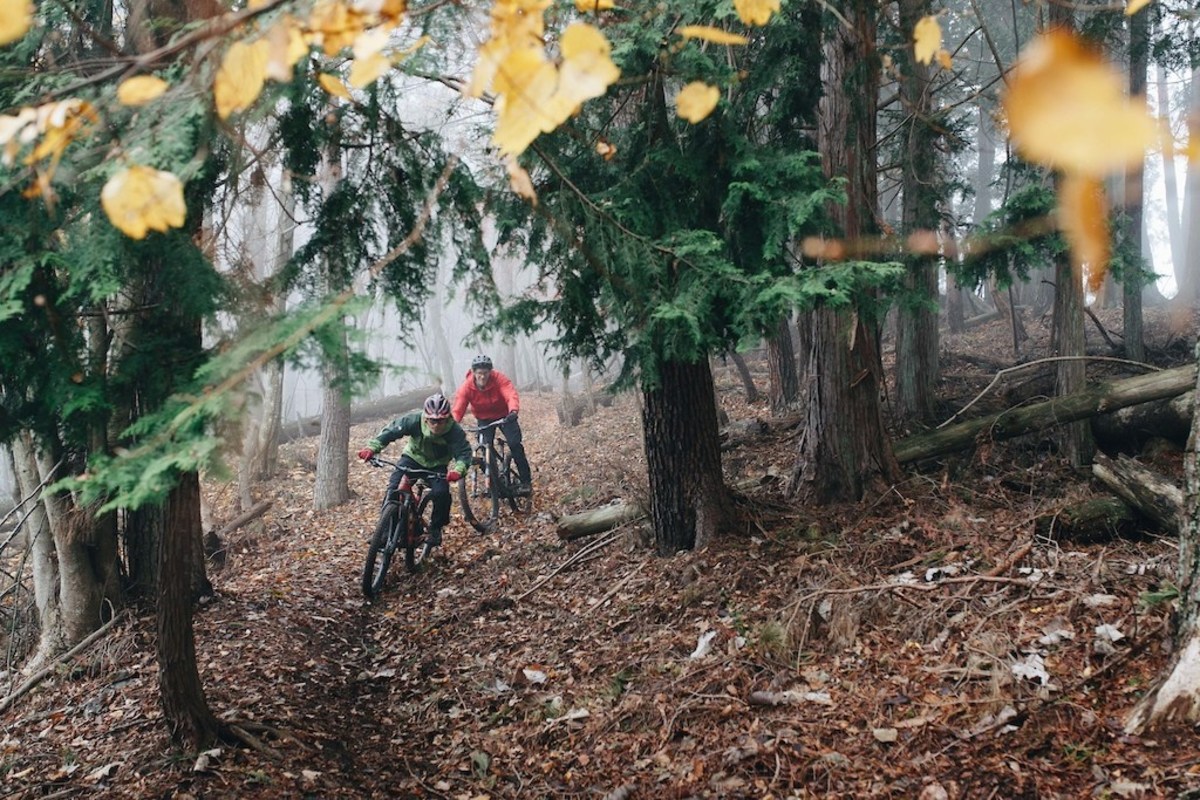Ryo Hazuma is a man who can—and will—move mountains. Living in the Minami Alps of Japan, he dedicates himself completely to developing and maintaining trails at this UNESCO World Heritage Site, all while consciously bridging the generational divide.
It is a place where the change in seasons is as elegant as the inaudible ticking of time itself. Flawless. Japan: The Land of the Rising Sun. We arrive there just as summer makes its gentle turn to pass the torch of change, bringing hues and saturation beyond the most vivid of imaginations.
It’s raining when we meet him. He’s wearing a bright, florescent hi-vis vest, decorated with various badges, some of which include a hunter’s badge, a trail steward badge, and a firefighter badge. At 1.65 m (5’4”) tall and no more than 60 kg (132 lbs.), he is clean cut and sharp, like the finest of Japanese Santoku knives. He walks over to us with short, deliberate steps, sticks out his hand, bows in respect, and smiles.
Ryo Hazuma.

At first glance, he’s not the quintessential mountain man you’d expect to find, but within the first few minutes of observing and listening to him, it becomes crystal clear: Ryo Hazuma is a man that can and will move mountains. Folks like him are referred to as mountain guardians, an unofficial title that envelopes this man in his entirety—an old soul with a youthful spirit.
For two years, Hazuma had traveled four hours every weekend to go find solace and meaning in the mountains. He lived in Tokyo, with his work a two-hour train ride east, and the mountains a two-hour car drive west.
Four months after our visit, Hazuma quit his job and moved to the Minami Alps to dedicate himself wholeheartedly to his vision. In his own words, “If I say I do it, I will do it.” Hazuma, it appears, shares the same compulsive conviction as John Muir, in that “going to the mountains is going home.”
Hazuma is what you might call a “trail Shogun.” His very surname was passed on through generations by the first Shogun of Japan. The term “Hazuma” refers to the space between the two nocks of a perfectly tensioned bow. He embraces it as his calling. This becomes almost eerily apparent when we witness first-hand how this conviction has revived a deeply rooted mountain tradition: The Night Festival.
In 2014, Hazuma introduced mountain biking to this centuries-old tradition in the Minami Alps. This beautiful festival was on the verge of dying, with more people moving away from the mountains to the cities to find jobs, and with the introduction of mountain biking it found new life. Young and old, mountain bikers and non-mountain bikers are traveling from far and wide to attend this festival.
A tradition saved, a culture preserved, a generation gap bridged.
This year was even more special, as around the same time Hazuma proposed and introduced mountain biking to the night festival, he also started discussions with the local city council and the mayor of the Yamanashi prefecture.
On the day leading up to the festival, we accompanied Hazuma as he met with the mayor and city council leaders to sign a document of approval, which will allow him and his team to officially develop and maintain trails in the Minami Alps, a UNESCO World Heritage Site. As rumor has it, this achievement is nothing short of a miracle. To get permission to develop anything new in Japan is an excruciatingly exhausting exercise and virtually impossible.
Tenacious.
Matt Hunter will tell you that once Hazuma has something in his head, he’s not letting go. In 2014, Hazuma was involved in one of Matt’s Trail Hunter trips to Japan. He made Matt promise that he would return to Japan if and when Hazuma got the permission to develop trails—in the likeness of fine Japanese art—from the top of the Minami Alps (3,000 m elevation at the highest point) to the bottom.
Furthermore, Hazuma, along with his fellow conspirator, Ryosuke Kimura, organized a Trail Builder Summit in conjunction with the Night Festival, and invited trail builders and advocates from all over Japan and other parts of Asia. Again, this was history in the making—a collective gathering among trail advocates in Japan had never taken place before.
Hazuma-san delivered and Matt kept his promise. Over 200 stoked mountain bikers built an entire new section of trail in the space of four hours. We rode bikes, we ate sushi. We rode some more. We took our shoes off before entering a room and we ate the world’s most questionable soup with chop sticks. We made friends with the school principal and the local firefighters—on two separate occasions—over generous helpings of small-batch sake (in Japanese culture, it’s rude to refuse). And the first Japanese word we learnt alongside arigato (thank you) was futsukayoi (hangover). It all came together with clinical precision.
In the same manner that the seasons in Japan graciously yield to each other with palpable respect, so do her people show their respect to each other, their craft and their surroundings. Ryo Hazuma, and the people of Japan who opened up their hearts and their homes to us, possess a quality of painstaking perseverance, a pursuit of perfection, a dedication to discipline, a respect and reverence of divine nature, and an embracing warmth, like first light in the land of the rising sun.
To the people of Japan and the mountain guardians like Ryo Hazuma all over the world, arigato gozaimasu. Thank you.

This article originally appeared on Bikemag.com and was republished with permission.
from Men's Journal https://ift.tt/2Kua6Ha
No comments:
Post a Comment